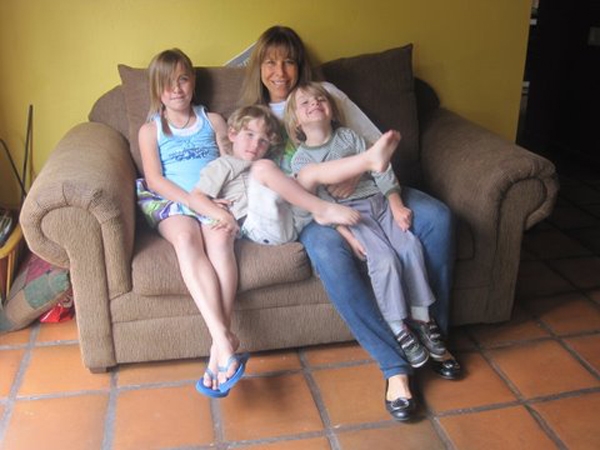NEW YORK (JTA) — Robin Gorelick thought she had done everything right.
For 17 years, she ran her own law practice. She lived in Calabasas, a picturesque, family-friendly Los Angeles suburb, where she owned her own home. Her kids went to Jewish day school, and she was active in her synagogue.
But then, in 2009, her biggest client went belly up, and all of a sudden the work vanished. As a single mother, she didn’t have another income to help support her household. For the first time, Gorelick worried about how she would make her mortgage payments.
She didn’t know where to turn.
Then, one of her kids’ teachers suggested she get in touch with someone at her synagogue, Temple Aliyah in Woodland Hills. She called, and got voice mail. Five minutes later, someone called her back.
“It was an unbelievable response how someone could care like that,” Gorelick recalled. “He told me, there were all different kinds of programs that the temple was supporting for any kinds of needs for the temple community.”
Across the country, American Jews increasingly are turning to their synagogues for help weathering these tough economic times. Rabbis and synagogue leaders are working to figure out how they can best help community members in need.
Gorelick’s synagogue started a program called Caring for the Community in 2004 at the behest of congregants interested in doing more charity work. As the financial crisis rippled through the community, Caring for Community became an essential resource, and a key way for congregants to help each another.
Jeff Bernhardt, the go-to person at the program, had compiled a list of congregants who were expert in foreclosures, refinancing and mortgages. He recruited CPAs, therapists and lawyers. He compiled a brochure of community organizations that could help. As a licensed social worker and Jewish community professional, the work came easy to him, he said.
Through Bernhardt, Gorelick found a mortgage broker who helped her sort through her financial options. Bernhardt also connected Gorelick with a human resources expert who helped her find a new job, in legal services.
Gorelick says she’s grateful.
“It’s truly the teachings of the Torah,” she said. “It wasn’t that I was handed a fish, I was taught how to fish. Now I have a job that I love, and I can support myself and my family, and I believe it’s because of the resources they put together.”
At Knesseth Israel Congregation in Birmingham, Ala., Rabbi Eytan Yammer began to notice an increase in calls for help. There were congregants who couldn’t pay rent or buy more groceries after losing power during a storm. So Yammer discounted their membership dues, offered maintenance jobs at the shul for those who were out of work and had congregants over for Shabbat meals.
When a woman and her daughter called to say they were unemployed and the bank was foreclosing on their home, he helped them look for a place to stay and kept calling people until he found a company that was hiring.
“It’s hard to get lost in the Birmingham community,” Yammer said.
“In a place like Alabama where everyone is religiously minded,” he said, it was easy to get Jewish community members to help each other out.
Yammer said he would like Jewish communities to create frameworks for Jews to reach out to each other to alleviate the small stresses that come with being unemployed.
Temple Rodeph Torah in Marlboro, N.J., did just that in late 2008, after the rabbi suggested during a High Holiday sermon that something be done. More than 100 people showed up to a subsequent meeting and created a program called TRT Cares that does everything from help with tax returns to coach people through depression.
Congregant David Levy, who oversees 50 to 60 volunteers and directs the program, said they have been able to help 145 people over the last four years.
“The resource we have is that a lot of families want to give,” Levy said. “We’ve put together an organization that actually works.”
It is a community-wide effort that welcomes anyone who is making an honest effort to improve themselves, not just Jews, according to Levy.
Ron Swaby was referred to TRT Cares through his church. With their help, he updated his resume and gained a more positive outlook.
“The intangible benefit of speaking to TRT Cares is that they speak very truthfully,” Swaby said.
TRT Cares’ success has attracted the attention of other synagogues. Temple Shalom in Aberdeen, N.J., has adopted a similar model. With about 40 volunteers, the shul has been able to help nearly 60 people polish their resumes, network and supplement their income over the past two and a half years.
Temple Sinai in Dresher, Pa., has taken a similar approach by creating a program called Congregant to Congregant that provides career networking, supplies transportation options and helps congregants get in touch with medical, dental and legal services. More than two-dozen people have been helped through the program.
As with other programs, however, the biggest obstacle remains finding a job.
At Temple Sinai, that’s where Howard Becker, who used to work in human resources at Lockheed Martin, comes in. He helps congregants develop a strategy to get back to work.
He says that the work the synagogue is doing isn’t charity, but the responsibility of the Jewish community.
“We have an obligation,” he said, “to our members who have a need.”
JTA has documented Jewish history in real-time for over a century. Keep our journalism strong by joining us in supporting independent, award-winning reporting.






